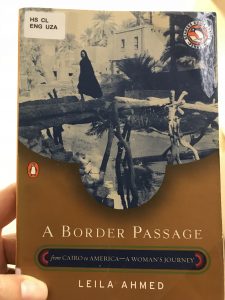March is Women’s History Month in many parts of the world. To help celebrate the recognition of women, I will only be featuring female authors during the month of March.
 A Border Passage: from Cairo to America — A Woman’s Journey
A Border Passage: from Cairo to America — A Woman’s Journey
“As she journeys across cultures, an Egyptian woman struggles to define herself. In language that vividly evokes the lush summers of Cairo and the stark beauty of the Arabian Desert, Leila Ahmed tells the story of her life. This moving memoir begins with her Egyptian childhood amid the rich tradition of Islamic women, and ends with her longing to understand and to come to terms with her own identity as a feminist living in America. Growing up in Cairo in the 1940’s and 1950’s, Ahmed witnessed some of the major transformations of this century: the end of British colonialism, the creation of Israel, the rise of Arab nationalism under Nasser, and the breakdown of Egypt’s once multireligious society. Through the turmoil, she searches to define herself–and to understand how the world defines her–as a woman, a Muslim, an Egyptian, and an Arab. She poignantly reflects upon issues of language, race, and nationality while unveiling the hidden and often misunderstood world of women’s Islam.”
(from the blurb on the back cover of Ahmed’s memoir)
About the Author
“Leila Ahmed (Arabic: لیلى احمد) is an Egyptian American professor of Women’s Studies and Religion at the Harvard Divinity School. Prior to coming to Harvard, she was professor of Women’s Studies and Near Eastern studies at the University of Massachusetts Amherst. She earned her undergraduate and graduate degrees from the University of Cambridge before moving to the United States to teach and write.
In her 1999 memoir A Border Passage, Ahmed describes her multicultural Cairene upbringing and her adult life as an expatriate and an immigrant in the West. She tells of how she was introduced to Islam through her grandmother during her childhood, and she came to distinguish it from “official Islam” as practiced and preached by a largely male religious elite. This realization would later form the basis of her first acclaimed book, Women and Gender in Islam (1993), a seminal work on Islamic history, Muslim feminism, and the historical role of women in Islam.”
(from Goodreads)

